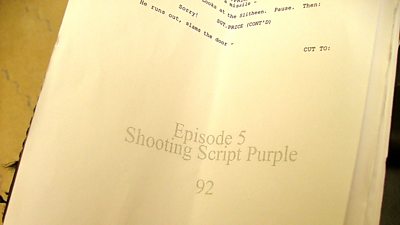For many budding screenwriters getting a literary agent is one of the big aims. Often screenwriters think if they can just get an agent to look after their interests, everything will fall into place. Is that true? Well, yes and no.
If you haven’t got an agent, you need to think about whether you do in fact need one, why you need one, and what, realistically, they can do for you.
You have to be in a position where you’re ready to have an agent. Most good agents will tell you that they’re much more interested in writers who have already built up their own head of steam. They’ll be less interested in having you as a client if they feel they’re taking you on from a standing start.
It’s very easy to think that an agent is going to provide the answers to all your problems, that they’re going to get you meetings and job offers all over town and kick-start your career.
You always have to remember that – ultimately - it’s good scripts that are going to do this. Some of the better agents may be able to get more people to read your (good) script – but if they haven’t got a brilliant portfolio of your work to show people, they’re as powerless as you.
So be clear about what you want / expect from your agent. You don’t want to go into the relationship with unrealistic expectations – that will only lead to general and continuing disappointment in the relationship.

One thing that I constantly hear from literary agents about potential new clients is that, alongside this portfolio of excellent scripts, what really attracts them to a writer is some evidence of that writer’s initiative, their get-up-and-go, evidence that they are going to be actively advancing their career prospects and making their own contacts, alongside the work the agent does for you.
Arguably, the time you actually need an agent is when you have an agreement that needs negotiating, and not before.
You need to work out which agents are right for you, and which agents are not. All of the reputable agencies have their own website, with listings of each agent within that agency, their clients and their clients’ CVs. Take your time, look through these lists, aim for the agents whose client lists excite you, agents whose clients work you like, and be specific about this when you contact them. An agent will be more likely to engage if they feel that you’ve done your research and are approaching them for very specific reasons that you can articulate. No agent worth their salt is going to be impressed by a blanket, mass ‘Dear Sir/Madam’ mail-out. You need to do your research and you need to aim high.
Talk to other writers who already have agents about what their agents do for them, whether they’re happy with their agents, and how they originally secured their agents. And talk to people in the industry who deal with agents regularly.
There is always though the big, thorny issue of most agents being unwilling to accept unsolicited submissions. So getting the best agent is also about the parallel work of creating and building your own network of industry contacts (and that’s a whole other blog!) But you need to use every avenue possible in pursuit of potential industry contacts, friends of friends of friends, to get scripts to people who may be willing to read your work. (And this comes back to the idea that an agent is much more interested in a writer who uses their own initiative and is actively trying to forge their own career path).
The bottom line is that most good agents will only consider new clients if they come with a personal recommendation from someone in the industry that they know and respect. If you’re not yet in a situation where someone’s willing to do this for you, then perhaps you’re not yet ready to have an agent.

Once you are in a position to start looking for agents – when you have made some industry contacts and have enough belief in your completed scripts that a top agent may be interested – that is the time to approach the right people.
One thing you should remember when you start contacting them is this - they work for you – you don’t work for them. OK, so it is a buyer’s market. But you need to keep this in perspective. If they take you on, you’re their ‘client.’ Don’t solely focus on desperately trying to please. You need to be asking them what they will be able to do for you. You’ll have to pitch yourself to an agent – but make sure they pitch themselves to you too. You need to know what you’re looking for in an agent, and go into a meeting armed with questions for them.
On the , we usually have several un-agented writers and by the end of the course, those writers will receive a lot of agent interest. It’s normal for these unrepresented 4screenwriting writers to be offered meetings with several agents. I always advise these writers to take their time in making a decision, to go and see as many of these agents as look interesting to them and to let each of those agents know that they are seeing several different agents and that they are going to take their time in making a decision about who they will go with. It’s human nature – there’s nothing more effective than playing hard-to-get! Agents will be more interested if you’re in demand. Whatever level you’re at, play it cool. Value yourself and what you can bring to the agent. Don’t put agents on a pedestal!

As with every other business, there are good agents, and not so good agents – or at least agents who are right for you and agents who are not right for you.
It’s all about personal taste – I know that there are clients of some agents whose work I’m more likely to enjoy than others.
Think also about where you will fit into the agency you’ll be joining. Is it better, for instance, to go with a newer, up-and-coming agent from one of the bigger agencies (eg , , , ) or to go with a more established agent who runs their own ‘boutique’ agency and who perhaps has a smaller list of clients? There is no hard-and-fast answer – it’s horses for courses.
It is a big decision – you’re in this for the long haul. And you need to find an agent who’s going to be by your side for that long haul. It’s so much about your personal relationship with your agent. You need to find someone who gets you both as a writer and a person, someone who is genuinely passionate about your work, who you know is going to do a good job selling you as a writer. Make sure they really like and understand your writing – as well as giving you good feedback. Demonstrate your initiative. Experienced agents know that a writing career is only sustainable if their clients have this in spades.
And make sure that your chosen agent is someone who you’re comfortable talking to, that you get on with, can be yourself with. You don’t want to dread every phone call you make to your agent.

Remember also that it may take a while to secure the right agent. Often agents will read a script, like it, but ask you to come back with your next spec script. If you think this agent is right for you, don’t let this put you off. Agents aren’t going to say this if they’re genuinely not interested. And sustaining a career in the long-term will mean continually writing new spec scripts.
Think about it from an agent’s POV. What is attractive about you to them? Why might they want to represent you? What evidence can you give them that people are likely to want to hire you? That you’re going to make money for them?
Agents need to be excited at the opportunity of representing you – they need to be ambitious on your behalf.
Read Philip's blog on
Read Philip's blog with
Read Philip's blog with
